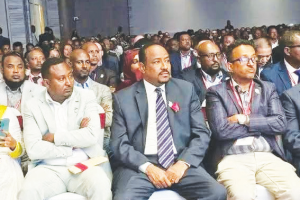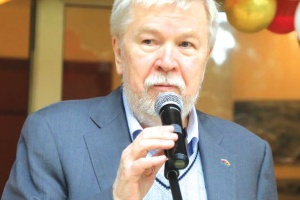The late Ethiopian poet and playwright and academician Mengistu Lemma often picked quarrels with people who asked him whether Ethiopian authors should write in foreign languages instead of the vernaculars or stick to their own languages in producing literary works. This debate goes back to the 1960s and even earlier. I remember a piece I read in the old Addis Reporter magazine where he was asking the same question. He answered was unequivocal as it has always been. He said Ethiopian writers should work in Amharic or in any other local language if possible, and let foreigners learn these vernaculars and translate them into English if they like them.
With his religious education and a strongly patriotic sentiment for Ethiopia and its national language which is Amharic, Mengistu Lemma might not be expected to think otherwise. His experience in Europe and America during the earlier decades had apparently strengthened his anti-colonial and anti-racist attitudes that were reflected even after he returned to his country and started to teach literature at the then Haile Selllassie University. He was not only popular for his plays that appealed to the common men and women but also wrote sophisticated poems and prose to the elite within the educational system and outside of it.
The debate was not however confined to Ethiopian literature or Ethiopian realities. Many African countries have also been wrestling with the same dilemma before and after the end of European colonialism that had undermined their cultures and languages and forced on them English or French as media of instruction or literary activity among the educated elites of the post-colonial generation in particular. The debate is still going on albeit in a lower voice although it is sometimes portrayed as “false dichotomy”.
With the dramatic advances in commercial publishing and the proliferation of publishing houses, it does not really matter nowadays whether it is advisable to write in the vernaculars or in a foreign language, spectacular because advances in publishing technology and the book business have created unprecedented opportunities for works that are written in the vernacular language to enjoy fast translation by foreign languages.
Many publishing houses are willing to get works written in any language, including works written in languages as remote as Chinese or Finish, to be translated in one of the commercially profitable languages and be thrown into the market. The fact that profit had long become the driving force for any commercial activity has also engulfed the writing and publishing business that has long adjusted to the demands of the market.
Ethiopia being a country that has not been colonized in the true sense of the term but has been ‘neo-colonized’ so to say, the question whether authors should write in the vernaculars or in English or French had never become a strongly controversial issue as it had been in colonized African countries. It has never been politicized or turned into a bone of political contention among the various elite groups. Ethiopia is an African country that has always been proud of its past history, culture and languages.
As Mengistu Lemma and his like-minded intellectuals maintained, Ethiopia should maintain its proud cultural or linguistic legacies in the face of colonialism or neo-colonialism neo-colonialism. This argument is still alive during this time of globalization when cultures have converged and languages influenced one another to the extent that there are many versions of the same language in many countries. Thus the English which is spoken in Britain and the US or Australia or New Zealand is different from the one spoken in many African countries or in the Caribbean.
There are even variations of linguistic forms and slangs within the same linguistic communities. The English spoken in Washington DC might be different from the one spoken in New York. There are also ethnic variations of the same linguistic affinity like the English spoken by black people and that spoken by the whites or the Hispanic communities in the US.
These kinds of variations can also be observed within power won country. The Amharic spoken by people in Gondar is believed to be different from the one spoken by people in Shoa or Gojjam. These slight differentiations however do not make it difficult for people in one region to communicate easily with people living in another region but speaking the same language.
When it comes to translating the literature of one region into another completely different language spoken by different people, the issues of ethnic, national or linguistic identities are inevitably surface and assume a controversial nature. The English spoken by the Gikuyu people in Kenya may not be different by the English spoken or written by different ethnic groups within the same country. But translating English into Gikuyu or the other way round inevitably raises a host of related issues of linguistic and national identities. The ultimate question is whether people of the Gikuyu tribe should write in their own language or learn English and read and write in English?
As a corollary of this question we can ask whether Ethiopian readers and writers write in their own languages (i.e. in Amharic, Oromiffa, Tigrigna, Somali… etc.?) or should they write in English and then translate their works into one of the local languages? In other words, should they write in a foreign language and then translate it into one of the local languages or should they work in their own vernaculars and then translate their works into one of the foreign languages (English, French, Russian., German…etc.)?
The linguistics department of Addis Ababa University is said to be considering English as a language of minority as it is spoken by a limited number of educated people in general. Since Ethiopia has never been a British colony, there is no substantial number of people using the language in the rural areas and in the cities as it is the case in Kenya. Thus English, although recognized as a minority language, is only spoken in the major cities and is confined to the small circles of educated elite.
For a long time under the monarchy, English was considered a working language, particularly given its role as a vehicle of transfer of knowledge from the West to Ethiopia. A good command of English was a big asset during those time and writing in English was considered a big skill and endowment although there were few Ethiopian authors who wrote in English or translate their works in that language.
The most memorable piece of literature written or translated into English by a major Ethiopian author, at least as far as my knowledge is concerned, is the late Haddis Alemayehu. He has penned a story entitled “The War of Cats and Mice” which was popular in its time.
Kenyan writers, whose country has a long history of colonial rule, have largely used English as a medium of literary creativity. Prominent among them is Ngigi Wa Tiongo, alias James Ngugi, who wrote many novels and short stories including plays such as “I will Marry When I want”. Ngugi is known for his outspoken stance against neocolonialism and imperialism and his decision to write in his native Gikuyu rather than in English is a kind of political statement.
Ngugi went as far as changing his name frome James Ngugi to Ngugi Wa Tiongo and he wrote his latest masterpiece known as “Wizard of the Crow” a bitingly satirical portrait of Kenya under the various domestic dictatorships and the corrupt elites. He wrote the novel in Gikuyu and then translated it into English without waiting the green light from any local translator or publisher. This may have some lessons for Ethiopian writers who are working in their vernaculars.
Ethiopia is a country with diverse ethnic groups who speak their languages although literary creativity is not much developed due to historical reasons. Amharic has long been the dominant language in the country and benefitted from certain privileges as a national language. Other languages such as Oromiffa, Sidama, Tigrigna, Somali and others that will soon become national languages, are bound to develop with time and serve as vehicle of their respective literary heritages.
It is therefore advisable for educated people speaking their specific vernaculars to write in the same local languages and then translate their works into English or any other Western language for that matter. This is a privilege only Ethiopians enjoy because almost all African elites were forced to write in one of the Western languages in order to get published.
The controversies surrounding the need to write in a foreign language or in the vernaculars now seems obsolete now that the choice is in the hands of African and Ethiopian writers. An increasingly globalised world has made it possible for languages to be spoken and written freely as a result of the proliferation of publishing and translation technology. The old patriotic writers like Mengistu Lemma have done their job by defending Ethiopian patriotism in the field of literature and the arts. Now, it is the turn of the new generations to take this patriotism one step ahead by working in their respective languages and exploit the opportunities for publishing and market available in the global book market.
BY MULUGETA GUDETA
The Ethiopian Herald May 9/2021





